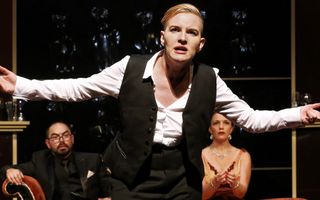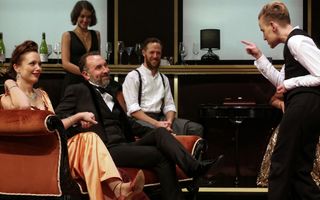 Listen
Listen
NARCISSISM AND POWER
Richard constantly displays qualities often attributed to narcissism: an exaggerated sense of self-importance, and an excessive need for admiration, power and success. He engages in constant manipulation of those around him and, as academic Coppelia Kahn explains, “He is unable to form or sustain bonds with others.” Sigmund Freud, who was famously fascinated with this historical and literary figure, claimed that “Richard is an enormously magnified representation of something we can all discover in ourselves. We all think we have reason to reproach nature and our destiny for congenital and infantile disadvantages; we all demand reparation for early wounds to our narcissism, our self-love.” The ultimate question that arises when discussing the character of Richard is whether or not his sense of self or ‘self love’ was wounded. Is Richard motivated by ill-fate, ill-treatment, and cheated by nature? Or is he so ruthlessly ambitious that he musters up false sympathies in order to use to them to his own advantage?
There are certainly arguments for both sides. Some modern theorists view Richard as a three-dimensional, psychologically-developed character, and feel that his moral condition is born out of other characters’ treatment of him. They claim that Richard cannot express love because he has never received it, noting confronting statements from his mother, the Duchess of York, who describes him as a “deformed lump” that she should have “strangled [in] her accursed womb” (Act 4, Scene 4). Such treatment is certainly worth considering as a cause of Richard’s malevolence. However, at times Richard displays an extremely inflated sense of self. In his opening soliloquy he states he is not “made to court an amorous looking glass” (Act 1, Scene 1), yet just as Narcissus couldn’t help but spy his reflection in the lake, Richard in no way shies away from his own figure. He rather engages with it, and after successfully wooing Lady Anne he quickly translates his “ill design” to “a proper man”, and says he should “be at charges for a looking glass” and hire tailors to “adorn” his body (Act 1, Scene 2).
Marjorie Garber (Shakespeare After All, 2004) believes that Richard is uneasy in a state of peace, when the “bruised arms are hung up” (Act 1, Scene 1), as peace represents something definitive or completed. Richard will never be so, as he is, by his own admission, “unfinished” and “scarce half made up” (Act 1, Scene 1). He will always be in a state of searching for more, a classic trait of the narcissist. British actor Mark Rylance sees Richard’s actions as a result of boredom, a behaviour inherent in someone unsatisfied. He believes it is this restlessness and need to dispel boredom that makes Richard so interesting to the audience; they know he will never stop or be satisfied. Whilst playing the title role at Shakespeare’s Globe in 2012, Rylance discussed how he felt Richard was in fact a narcissist, but not a psychopath, and that the difference was important. Rylance supports Freud’s notions, believing that Richard’s highly self-interested behaviour results from an immense ‘self-pity’ that mainly stems from his relationships with women, his mother in particular.
So, considering this, what is it that Richard is after: love, power, revenge, satisfaction? Some claim Richard simply revels in the idea of advancement and the act of evil, and is actually not interested in the responsibilities of power, and thus fails to maintain it. Richard proclaims in Henry VI, Part 3, “How sweet a thing it is to wear a crown” (Act 1, Scene 2), but perhaps he is more interested in the process rather than reaching the final finished product, and never will be satisfied.
DEFORMITY AND ISOLATION
In the opening soliloquy of Richard III, Shakespeare foregrounds Richard’s body as a direct motivation for his shrewd political bloodiness:
Why, I, in this weak piping time of peace,
Have no delight to pass away the time,
Unless to spy my shadow in the sun
And descant on mine own deformity:
And therefore, since I cannot prove a lover,
To entertain these fair well-spoken days,
I am determined to prove a villain
And hate the idle pleasures of these days.
Act 1, Scene 1
In fact, most characters in the play cannot seem to criticise Richard’s actions without aligning them to his physical form. His deformity and unnatural ‘breech’ entrance into the world are constantly mentioned throughout the tetralogy. He is labeled a “foul indigested lump” (Act 5, Scene 1, Henry IV Part 2), an “abortive, rooting hog”, a “bottled spider” and even a “slander of thy mother’s heavy womb” (Act 1, Scene 3).
Many theorists have claimed that Richard utlilises his body as a performative prop, as both an excuse and a distraction: it prevents him from looking fair, thus excusing him from social graces and allowing him to explain away past ills. Just as much as his mother curses the teeth he was born with, so does he put them to good use, saying that he will “play the dog” and “snarl and bite” (Henry IV, Part 3, Act 5, Scene 6). In her studies on the rhetoric of disability in Shakespeare’s works, Katherine Williams believes that by presenting Richard’s body along a “continuum of ability, in which his physical difference becomes more or less apparent depending upon how he emphasizes it, Richard's use of his physical frame, a body that he initially decries, actually works to challenge the binary between able/disabled bodies”. In other words, Richard acknowledges his disability and its limitations, yet then makes the disabled body full of infinite, able potential.
Critics continue to claim that Shakespeare’s exaggeration of Richard III’s disabilities (most notably adding the limp and/or hunchback) is a result of a playwright either appeasing the monarchy or a sign that he himself fell under the spell of the Tudor myth. Richard had to be made as ‘ugly’ as possible, in form and nature, because he is the last of a family reign responsible for the corruption of state. Academic Coppelia Kahn states that Richard is the symbolic “lump of chaos born of England’s Chaos” and lliterary critic Stephen Greenblatt argues that "Richard's deformity is less the cause of his evil nature than its sign." So is Richard, and his deformity, a symbol of evil and the corrupt state, or does he actively cause peril and corruption because of the treatment his deformity receives?
Richard’s physical appearance may be symbolic in many ways, but it is also very real and present, and he engages with it constantly. In Henry VI Part 3, Richard describes his own deformity: “Like to a chaos, or an unlick’d bear whelp that carries no impression like the dam. And am I then a man to be beloved” (Act 3, Scene 2). Prior to the death of his father, the Duke of York, Richard shows great passion for his father’s right to the throne, yet as the play continues, he begins to distance himself and question all family allegiance and relationships. Whether this stems from a feeling that he doesn’t resemble his kin, from a general lack of love, or from feeling that he actually cannot be loved, is up for debate. At several points throughout Richard’s journey in the tetralogy, he addresses his own feelings or want for isolation: whether it be enforced as a result of his appearance or a self-inflicted, chosen state is under continuous contention. In Henry VI Part 3, in his famous final soliloquy, Richard renounces all kin, connection and understanding of love:
I had no father, I am like no father;
I have no brother, I am like no brother;
And this word ‘love’, which greybeards call divine,
Be resident in men like one another
and not in me - I am myself alone.
Act 5, Scene 7
In Richard III, after the visitation of the ghosts before the Battle of Bosworth Field, Richard notes his own fear and isolation as one and the same thing: “What do I fear? My selfe? There’s none else by” (Act 5, Scene 5). So, does he fear isolation itself, his own self, or the fact that the isolation he so avidly sought has made him confront his ‘true self’?
If Richard doesn’t have any relationships with the characters on stage, he certainly has a close connection with the audience. He declares and shares his amorality and private ruses with the audience right from the opening lines of the play. In fact, almost every scene in Act 1 is bookended with one of Richard’s soliloquies and he continues to do this throughout the play. So much so, that the audience are carefully placed as complicit co-conspirators. They are forced to be privy to Richard’s plans and must sit by, silently, as he carries them out. Considering this, does Richard merely use us in order to glorify his own narcissism? As Richard loses control and favor with the state and its citizens, his interactions with the audience notably lessen, and the last time we have private counsel with him he bids us farewell by questioning his own self-love – “Richard loves Richard... O, no! Alas I rather hate myself” (Act 5, Scene 3). Perhaps the only true relationship he ever had was with himself, and this too is lost.
MORALITY AND CONSCIENCE
The Machiavellian villain had an immense impact on the Elizabethan dramatists, and Shakespeare’s exploration of the interior ‘will-to-power’ and the outer deceptive mask has dominated much study of his works. Shakespeare’s characters vary in their moral framework and ability to engage with their conscience. Macbeth, for instance, spends a great deal of time in constant doubt and consideration. He acknowledges his “black and deep desires” (Macbeth, Act 1, Scene 4), but fears them, whereas Richard does not. In fact, he revels in them.
Many theorists feel that Richard, like Iago, Goneril and Regan, is morally ambiguous and his motivations are both unclear and unjustified. However, in his introduction to the Arden edition, James Siemon claims that it is Richard’s “clarity of motive” that empowers him, and that it is his “sheer nerve” in which he’ll go to any means to achieve the crown, which makes him so formidable.
In an interview in 2012 whilst playing Richard at Shakespeare’s Globe, actor Mark Rylance stated:
In rehearsals I thought, ‘No, he’s not a psychopath’. Shakespeare placed a conscience in this man who didn’t have a conscience. As Kevin Spacey said to me, it is a play about a man that doesn’t have a conscience and grows a conscience. I don’t think psychopaths dream either.
Richard’s last confession in Act 5, after the dream-like visitation of the ghosts of his victims, is probably the most telling, as it is his only clear moment of internal division. He oscillates between self-love and self-loathing, he labels himself a villain, then instantly withdraws the accusation. He does, however, state that this:
Conscience hath a thousand several tongues,
And every tongue brings in a several tale,
And every tale condemns me for a villain.
Act 5, Scene 3
WOMEN AND CURSES
There is no doubt that the women of Richard III suffer inequality, great tragedy and deep suspicion. They are at best desired, but more often than not they are manipulated, scorned, resented, exploited, and mocked. Richard is a clear misogynist. He doesn’t take women seriously, is deeply disconnected from them, and views them as mere pawns in his political game. He only attributes power to them in order to transfer blame, for example when convincing Clarence of Queen Elizabeth’s betrayal: “Why, this it is when men are rul’d by women” (Act 1, Scene 1).
Women are reduced to stereotypes such as, “strumpets” (Act 3, Scene 4), practising “witchcraft” (Act 3, Scene 4), who are “shallow, changing” (Act 4, Scene 4), “lunatic” and “frantic” (Act 1, Scene 3). The women in Richard III move from states of power to powerlessness and pity, and then off stage altogether. Unlike the Henry VI trilogy, the women now have no control or business in the state, they are reduced to the role of cursing and mourning. Margaret, who was once a great political and military leader who proclaimed “Great Lords, wise men ne’er sit and wail their loss, but cheerily seek how to redress their harms” (Henry VI Part 3, Act 5, Scene 4), is now a mouthpiece of cursing and lamentation.
Despite this, Shakespeare has ensured that these women and their children are central and essential to the play. The words ‘mother’ and ‘children’ occur in Richard III more than in any other Shakespeare play. The nobility and church are either silent or driven by self-interest; it is the women that unite and offer the only real resistance to Richard prior to Richmond’s invasion. Although not devoid of her own moral failings, Margaret’s outbursts are honest, and as if a prophetess, she sets up and predicts what will prove the downfall of Richard’s reign. Her initial curse on Richard in Act 1, Scene 3 works much like a prologue predicting his fate:
If heaven have any grievous plague in store
Exceeding those that I can wish upon thee,
O, let them keep it till thy sins be ripe,
And then hurl down their indignation
On thee, the troubler of the poor world's peace!
The worm of conscience still begnaw thy soul!
Thy friends suspect for traitors while thou livest,
And take deep traitors for thy dearest friends!
No sleep close up that deadly eye of thine,
Unless it be whilst some tormenting dream
Affrights thee with a hell of ugly devils!
Act 1, Scene 3
Lady Anne, who is initially beguiled by Richard’s dissimulation, comes to realisation through her own instinctual fear and willingness to place morality above personal gain – “I would to God that the inclusive verge of metal that must round my brow were red-hot steel to sear me to the brain” (Act 4, Scene 1). She would rather give up her crown, than wear it as Richard’s wife and companion. The now experienced Queen Elizabeth manages not to be swayed by Richard’s wooing of her daughter (as she herself was by Edward) and postpones his proposal.
Act 4, Scene 4, when the women unite, is often viewed as the emotional heart of the play. Their combined loss and grief inspire great empathy and Margaret teaches her younger counterparts how to curse:
Think that thy babes were sweeter than they were
And that he that slew them fouler than he is:
Bettering thy loss makes the bad-causer worse
Revolving this will teach you how to curse.
Act 4, Scene 4
It is here that tears and lamentations finally become fiery ammunition, and the women can theoretically take back power; ‘Thy woes will make them sharp and pierce like mine’ (Act 4, Scene 4).
SUCCESSION, FATE, AND FATALISM
Many critics believe that Shakespeare’s Richard III was confirming the growing Tudor myth that on the day Henry Tudor, the Earl of Richmond (Henry VII), killed Richard and took the crown, he restored England to peace and rightful rule. Factions of the Protestant reformation saw Richard as God’s final curse on English society. The ruling classes of Shakespeare’s world were a society that strongly believed fate was predestined by the Divine Right of Kings, in which the worthiness and moral standing of the ruler directly determined the balance and well-being of the nation. It was imperative for such a society to confirm themselves the chosen people, with God on their side.
In the case of Richard, it is implied that his lack of claim to the throne and corrupt and bloody nature is personified in his ‘misshapen’ form. In asserting his claim as a Tudor and rightful ruler over Richard, Richmond uses images comparing the state of England to the human body. He states that England has “scarr'd herself” under Richard's brutal reign and will now find “smooth'd-fac'd peace” (Act 5, Scene 5). Richmond also infers that unlike Richard “The wretched, bloody, and usurping boar, that spoil'd your summer fields and fruitful vines” (Act 5, Scene 2), his rule will offer prosperity.
Sleep was also perceived in Elizabethan times as directly connected to one’s state of mind and fitness for position. On the morning of the Battle of Bosworth, Richmond reports that he had the “sweetest sleep and fairest-boding dreams” whilst Richard awakes to tell his men that “Shadows tonight have struck more terror to the soul of Richard than can the substance of ten thousand soldiers” (Act 5, Scene 3).
Throughout his history plays, Shakespeare undermines monarchist ideologies rather than endorsing them. For instance, Richard III doesn’t respect tradition but rather utilises and manipulates the rule of succession to his own advantage. His most shameless act in doing so is the slander of his brother Edward, in which he spreads claims of illegitimacy that result in the deaths of the young Princes. Buckingham states that with this act Richard claims to restore “the lineal glory” of the “royal house” (Act 3, Scene 7), yet this scheme works to disable Richard’s family, a hideous outcome that Richard openly confessed to having desired. Considering the Machiavellian concept of power, it is often believed that Richard is acting completely out of his own free will and that Shakespeare has Richard declare that he is “determined to play the villain” (Act 1, Scene 1) as a pun, ironically mocking the notions of religious and royal predestination.




